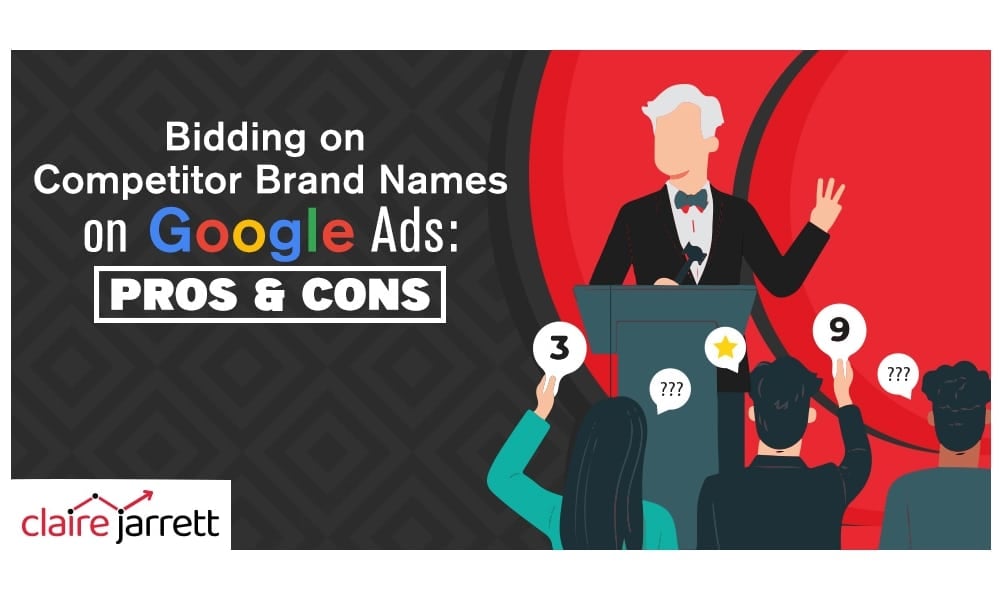Should You Bid on Competitor Brand Names on Google Ads?

Last Updated on: 29th January 2025, 11:52 am
If you want to ramp up your paid search performance, you’ve probably considered bidding on competitor brand names on Google Ads. This can give you quite a brand boost, but only if you do it right.
In this article, I’ll show you the key aspects of bidding on competitor brand names, the pros & cons, and common mistakes you should avoid.
You can click the dropdown arrow on the right to view the Table of Contents or just get started below.
What Is Bidding on Competitor Brand Names on Google AdWords?
Put simply, branded terms are the type of keywords that have a brand name in them. Branded terms can be yours or your competitor’s.
For example, my branded term is “Claire Jarrett.”
Other examples of branded terms include “Coca-Cola,” “Tesco,” and so on.
You typically have two options when it comes to bidding on branded terms:
Bid on Your Own Branded Terms on Google Ads
Sometimes, you want to bid on your own brand name even though you might appear organically when someone looks up your name.
The main reason is that you want to take up as much SERP real estate as possible.
Displaying a paid ad for your branded search term can also help direct the searchers who might be ready to purchase to the right landing pages. Otherwise, Google could organically lead them to your homepage, which isn’t primed for conversion. However, this is an advanced Google Ads strategy, so it’s best to consult a professional to avoid mistakes such as cannibalising your regular campaigns.
You Can Bid on Competitor Brand Names on Google Ads
Make your way into your competitors’ digital landscape by placing paid ads for their branded terms.
If a searcher is looking for your competitors (and your product is a close alternative), they might prefer your product. If your value proposition meets the exact search intent, it makes sense to bid on the competitor’s brand name.
You can also boost brand awareness by bidding on powerful competitors’ branded terms. For example, suppose you’re a project management startup. In that case, you might bid on “Asana” to get your product in front of more purchase-ready searchers.
Pros of Bidding on Competitor Brand Names on Google Ads
Firstly, you give searchers more options.
For example, if they’re looking for a specific brand, then they are probably going to click on their ad or their organic listing. However, if the searcher wants the best product or services at optimal rates, they won’t care which brand they choose.
If you’re in an industry where searchers shop for the best prices or different service/product options, it would make sense to bid on competitor brand names on Google AdWords. Just make sure you understand the intent behind the search.
Secondly, you position yourself favourably compared to competitors. If you offer unique value, bidding on competitor brand names on Google Ads is an excellent way to highlight why searchers should choose you.
Brand names are relatively low-competition, so the keywords are cheap to bid on. Some brands are already bidding on their own names, but many don’t.
Ultimately, you’ll get plenty of targeted impressions or clicks for a fraction of what you spend for other keywords.
Cons of Bidding on Competitor Brands
Technically, you could initiate a bidding war. If competitors find traffic dropping off because of your ads, they could start bidding on your brand name. It won’t be a problem if you’re secure about your position in the market.
But if you only offer a cheaper deal than your competitors, a bidding war could impair your ROI.
Bidding on competitor brand names can be costly in the long term. Branded campaigns are usually cheap, but if your competitor ramps up their bidding, you could find yourself spending more than you earn. It’s not the ideal choice for a small business Google Ads budget.
You could pay more because of a lower Quality Score. You might notice your click-through rate for competitors’ branded terms is lower than the CTR for your own terms. Think about the intent: the searcher is looking for the competitor – not you. Naturally, they won’t click on your ads as often.
In the long term, this can decrease your Quality Score. If you have other competitors on that branded term, you could end up paying more for each click.
Mistakes to avoid if you plan to bid on competitor brand names
Pick the correct competitor brand names to bid on. You shouldn’t bid on every competitor brand name you come across. Instead, focus on brands that you can outshine in the search:
- Do you have better products/services?
- Do you offer unique features the customers are looking for?
In short: try to pick competitors who don’t have better products than yours.
You want to better differentiate yourself and satisfy the (searcher’s) intent. If you can’t, don’t bid on the term.
Your Google Ads copy needs to reflect your brand’s USP, too—give searchers a solid reason why they should choose you over your competitor.
Your Google Ads copy needs to reflect your brand’s USP too—give searchers a solid reason why they should choose you over your competitor.
Be careful about bidding on specific devices. Many searches today happen on mobile, so you want to be cognisant of the intent – the reason people are looking up keywords. Suppose you’re bidding against a local brand. In that case, there’s a chance people are looking for them to find work hours or a nearby location, and they’re already set on purchasing from them.
Don’t use a competitor’s brand name in your ad text. It can lead to trademark violations! Always ensure your ad copy doesn’t mislead users into thinking you’re affiliated with the competitor and don’t “come for them” directly. Instead, allude to how your features are better in your ad copy.
Similarly, don’t ignore the Quality Score. Relevance matters. Even though you’re targeting searchers who are researching your competitor, they’ve still come to that SERP with specific intent. Make sure your ad matches it and has a good Quality Score. Speaking of which, you can add ad extensions to your competitor brand name ads, too! If they have some very prominent features or use cases, creating a page of your own addressing how your offer deals with that is a good way to position yourself favourably.
Finally, bidding on competitor brand names is not for everyone.
If you have just started with Google Ads, I recommend against bidding on competitor brand names unless you’ve carefully positioned your product and researched your keyword journey.
What Should I Do If a Competitor Is Bidding on My Brand Name?
Unless there are slanderous or false claims, you can’t prevent the competitor from bidding on your brand names. However, you can run your own counter-ads, especially if you’re only appearing in the organic results with a minimalist placement.
Of course, first, assess the impact. Is the competitor’s ad targeting you specifically, or are they just casting a broad net so they appear in front of their entire competition’s customer base? Chances are, their ad won’t be relevant to searchers.
Still, analyse their ads and landing pages to understand their strategy. Then, work with a Google Ads expert to identify the most profitable approach to dealing with competitors that are targeting your brand terms.
Should You Bid on Competitor Brand Names?
Be strategic and smart with your competitor brand name campaigns. The ultimate answer is up to you, but I’d strongly advise you to consult a Google Ads specialist before jumping in. Brand campaigns are advanced, so if you want to generate easy revenue for a cheap CPC, reconsider.
Once you scale and establish yourself in the market, you’ll be able to confidently go after competitor brand names and show the searchers that, yes, your business wins. Every single time.
If you need assistance evaluating and setting up your competitor brand name campaigns on Google Ads, get in touch with me or get your copy of my best-selling Google Ads book that helps you achieve rapid success in 7 easy steps. I’ve been helping business owners generate higher ROI from their Google Ads campaigns since 2007. Today, I’d love to help you!










